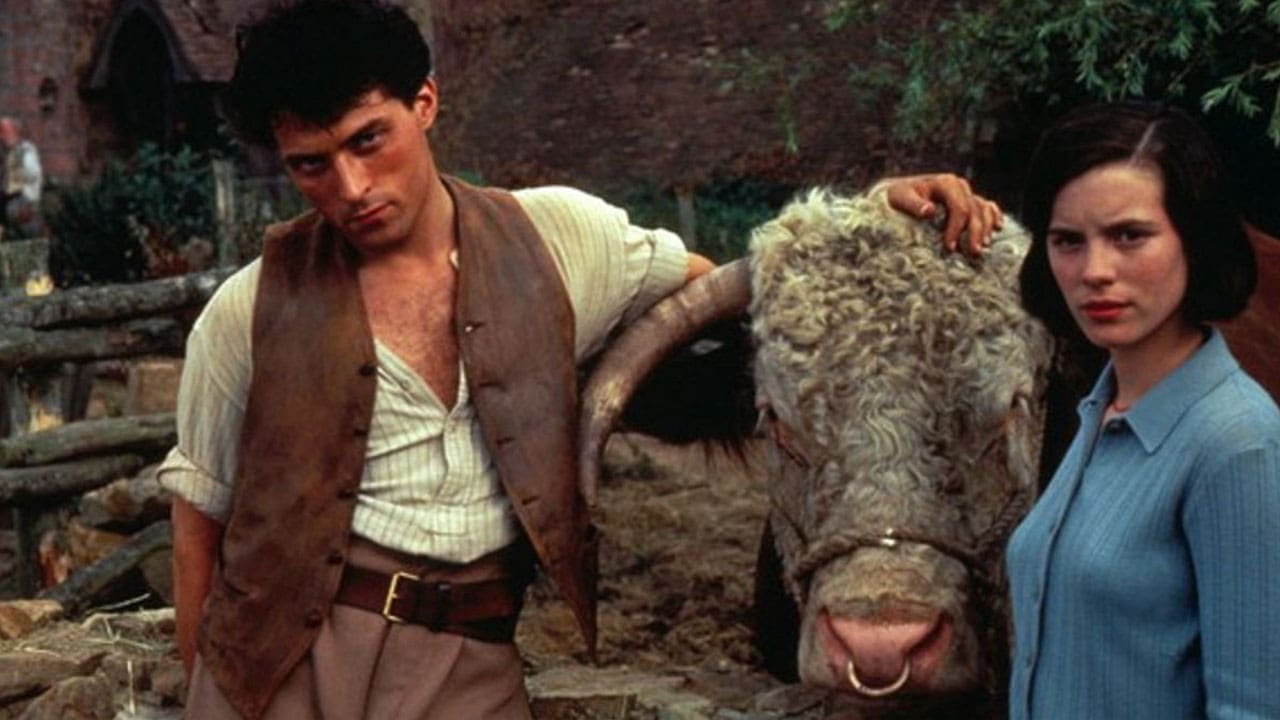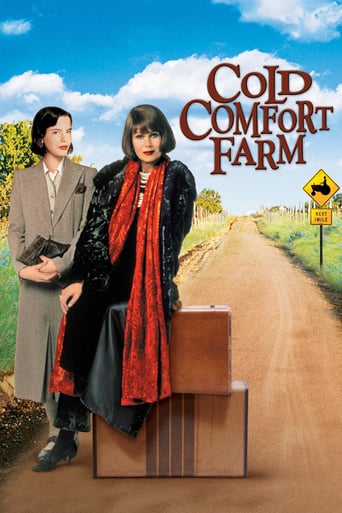

Oh how I loved this movie. It's movie heaven to me. It's funny, romantic, escapist, and has a happy ending. It left me feeling happy and energized. I just got the DVD and hadn't seen the movie before, and I was delighted. This is the sort of movie the Brits excel at: it's subtle, not violent, has superb performances, has a wry, intelligent script, the cinematography is visually beautiful shots of the British countryside, and the score is lovely and sets and matches the tone of the movie. It's low key and humanistic as opposed to Hollywood mainstream blockbusters with their explosive special effects. Farm doesn't have any special effects but is a delight because of the witty, intelligent script, superb acting, and visually gorgeous cinematography.I recommend turning the subtitles on if you're watching the DVD because the British accents and slang make it easy to miss words and lines without the subtitles.
... View MoreThe movie opens with "I saw something nasty in the woodshed." It is a Freudian reference. Freud originally thought such visions were manifestations of actual events that were so horrible that the memory was repressed. He later renounced that theory and decided that such dreams were manifestations of suppressed desires and emotions. The subject never actually sees what was nasty and the woodshed is not real, either.Modern psychotherapists, for the most part with minimal training, have gone back to Freud's original theory, but the supposedly 'repressed memories" invariably are so far-fetched as to violate fundamental laws of physics. Ada Doom's memory, for example, would probably have a woodshed with many rooms, stairs both up and down, windows, etc., all fitting within the small exterior of the building. The "something" nasty would include people who may well have been dead at the time, or who were far away, or who never existed at all. The ax implies murder and human sacrifice, a manifestation of feelings that she was mistreated by her own parents (or maybe Robert Poste). The dark wood-stains and shadows imply blood. The interior of the woodshed is dark, mysterious and quiet, as of a horror lurking there -- a hidden truth that no one can face.The movie, made during the height of 1990s witch hunt, parodies people who use memories of imaginary (or even real) events to control everybody around them. Interestingly, earlier productions were made during similar cultural periods. The 'something nasty' can represent anything from incest to fear of financial ruin to communism.The nasty memories, probably of fictitious events, manifest themselves in the untidiness of the Starkadders. The farm is practically in ruins, despite the fact the Starkadders are wealthy. Everything is all loose ends, hidden secrets, unfinished business. Flora Poste represents the traditional Freudian therapist, one who sees through all the junk of the mind and starts putting things in order by forcing people to see the truth about themselves and their situation, to stop dwelling on events (which are imaginary anyway) of the past and which have absolutely no bearing on the present. The Starkadders, one by one, have a paradigm shift away from suspicion, secrecy, and guilt to productivity, optimism, and adventurousness. They no longer live in fear.The movie ridicules fear and guilt. They are not just 'untidy,' they enslave us, tie us down, and keep us from reaching our full potential. Flora Poste represents the whole woman, idealized. She fears nothing for herself, despite the fact that she is the one character that actually has serious problems to deal with. Orphaned, virtually penniless, with an uncertain future, yet she could not care less. Unlike the miserable Starkadders who are helpless despite wealth, position and power, Flora Poste is the master of her own fate despite her lack of all the advantages the the Starkadders have.The movie allows us to laugh at our fears and shortcomings, and encourages us to take control of our own destinies. What is not to like about it?
... View MoreIf you are searching for comparisons to help you decide whether to watch "Cold Comfort Farm" imagine a slightly older "Pollyanna" going to live on a rundown version of "Babe's" English farm with a strange and bleak collection of her country cousins. This is an excellent and very earthy adaptation of Stella Gibbon's 1932 satirical novel (which itself is an odd marriage of Hardy and Wodehouse). Where the village pub is named "The Condemned Man" and the cows are named Aimless, Feckless, Graceless, and Pointless. Both the novel and its adaptation are joyfully depressing and packed with literary eccentricity and subtle humor. If you like "Faulty Towers" then you can expect to get off on the humor. But if you prefer "Hot Shots! Part Deux", you should probably pass on "Cold Comfort Farm". There are three possible viewer reactions: It's not funny. I didn't figure out it was a comedy until halfway through but then I found it hilarious. I couldn't stop laughing. Kate Beckinsale plays Flora Poste (always referred to by her relatives as Robert Poste's daughter), a recently orphaned 19 year old who chooses to live with relatives (the Starkadders) she has never met, at gloomy Cold Comfort Farm in Sussex. Beckinsale, even more radiant than usual, pulls off a nice characterization of the resourceful yet snobbish heroine. Like Pollyanna, she is a catalyst for positive change, but they are calculated changes. Her instinctive snobbishness (Beckinsale has a real talent for this) is played for laughs since everyone would feel a bit superior and distanced from this eccentric collection of misfits.The adaptation nicely incorporates Gibbons's subtle parody of Jane Austen romantic clichés, from the controlling madwoman in the attic to wood nymph poetess, to the quivering parishioners. Even the production design is a funny send-up of the standard BBC mini-series look. This is really a terrific production, doubly so for Beckinsale fans.Then again, what do I know? I'm only a child.
... View MoreThis movie is listed as a comedy genre. However, aside from the old matriarch beating everybody with a newspaper, I did not find one funny scene to laugh at.I won't criticize the acting because the performers do a fine job in their acting abilities. But, the story is unbelievable by American contemporary standards. I can't conceive of any American family which would relegate themselves to such constant misery by living on a farm what is falling apart. The characters would have left the farm for the city long ago and "Robert Poste's child" would have showed up to a half-empty farm. Likewise, the characters are too dirty living. Unwashed faces, dirty clothes never cleaned all make for an interesting scene if it were a war movie with the people in the mud in combat. But, for day to day living it seems that even in the 1920s people cleaned their bodies and clothes.Well, as Flora Poste flies off into the sunset in an open cockpit plane, "All's well that ends well."I think this "story" would turn out better if it were a stage play rather than a movie. It has stage possibilities! The characters' personalities lend themselves to providing a good stage casting.Larry from Illinois
... View More